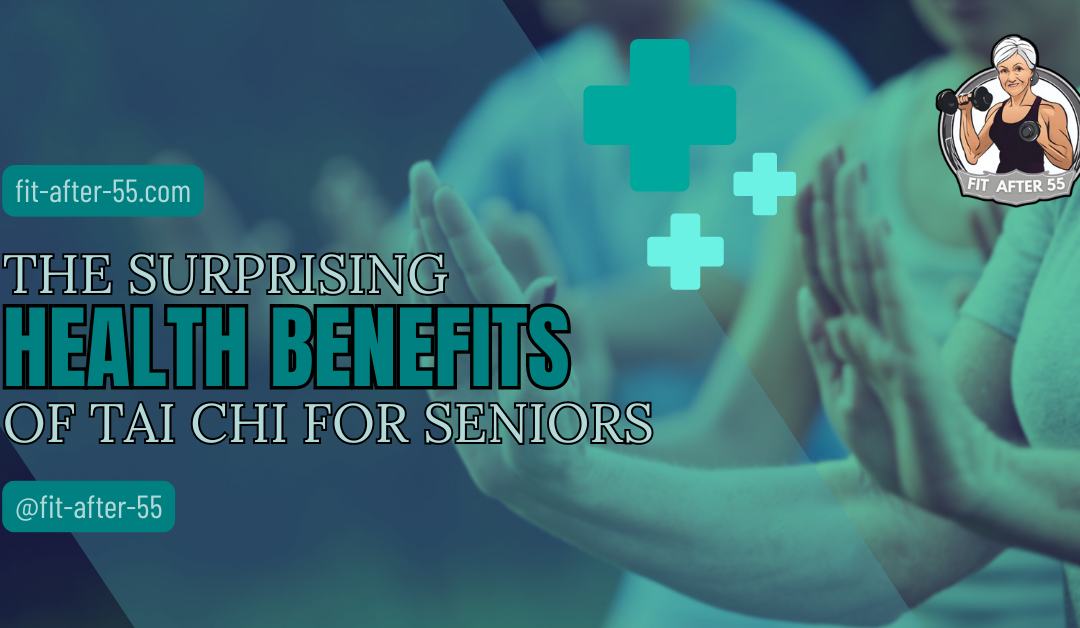Tai Chi, often described as “meditation in motion,” offers more than just graceful movements and serene mindfulness; it can significantly enhance the health and well-being of seniors. The health benefits of Tai Chi for seniors are gaining recognition for their ability to improve balance, flexibility, and mental clarity, making it a perfect fit for older adults. However, the advantages extend far beyond physical fitness—research suggests that regular practice can boost emotional health, reduce stress, and even enhance cognitive function.
In this article, we will explore the surprising health benefits of Tai Chi for seniors, uncovering how this gentle practice can transform their bodies and overall quality of life. From promoting better sleep to fostering social connections through group classes, Tai Chi offers a holistic approach to wellness. Get ready to discover why Tai Chi might be the ideal addition to a senior’s wellness routine!
Tai Chi for Seniors: Discovering Its Hidden Health Advantages
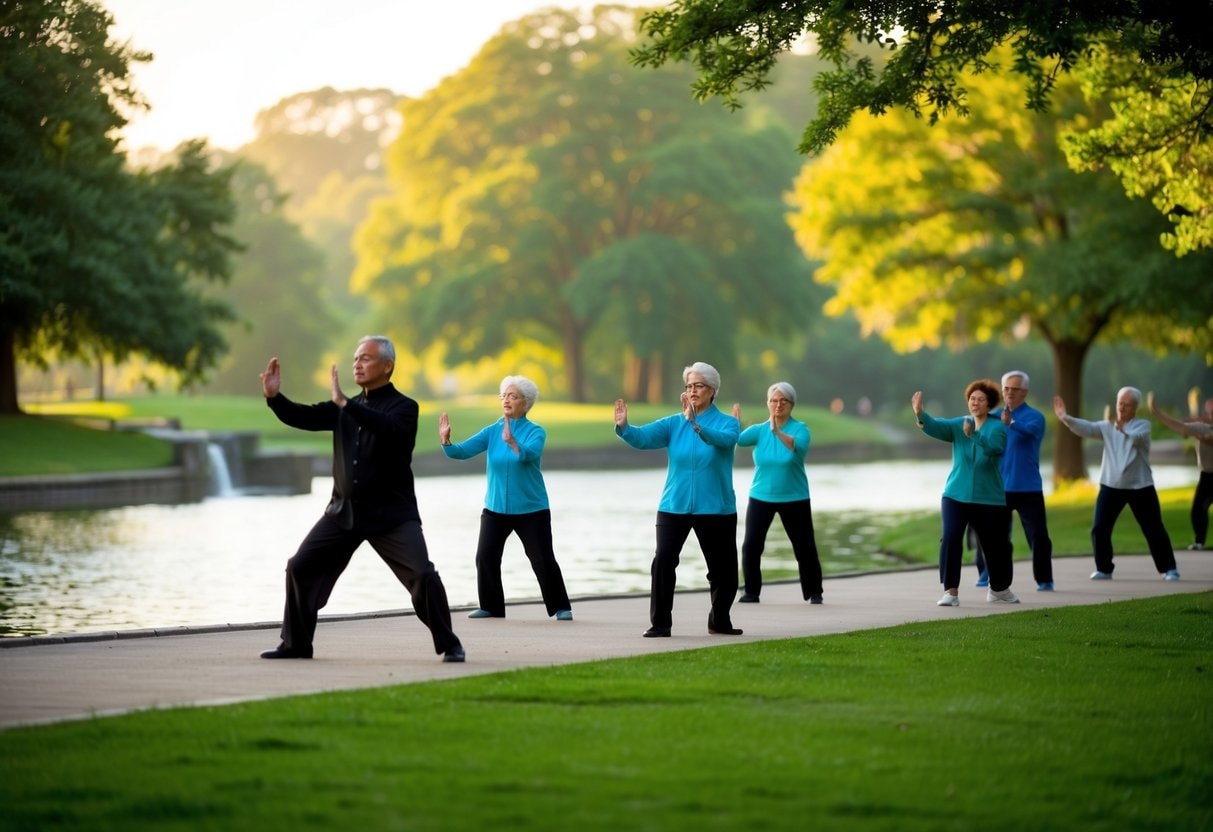
Tai Chi is a gentle exercise that can do wonders for seniors’ health. This ancient Chinese practice combines slow, flowing movements with deep breathing and meditation, offering many health benefits of Tai Chi for seniors. It’s easy on the joints and can be done by people of all fitness levels. Seniors who practice Tai Chi regularly can improve their balance and reduce their risk of falling by up to 50%. This is crucial for older adults, as falls can lead to serious injuries and loss of independence. But the benefits continue beyond there.
Tai Chi can also help lower blood pressure, ease joint pain, and boost mood. You might be surprised to learn that Tai Chi can even help you sleep better. Many seniors struggle with insomnia, but the relaxation techniques used in Tai Chi can lead to more restful nights. Better sleep means improved memory, a stronger immune system, and a lower risk of accidents during the day.
Key Takeaways
- Tai Chi can improve balance and significantly reduce fall risk in seniors.
- Regular practice may lead to better sleep, lower blood pressure, and reduced joint pain.
- Tai Chi is a gentle, low-impact exercise suitable for seniors of all fitness levels.
Understanding Tai Chi
Tai Chi blends slow, graceful movements with deep breathing and focus. It is a unique way to exercise your body and mind simultaneously.
The Roots of Tai Chi: Chinese Philosophy and Martial Arts
Tai Chi started in China long ago. It comes from Taoist ideas about balance in life. People first made Tai Chi as a fighting style. But over time, it became a way to stay healthy. The name “Tai Chi” means “supreme ultimate” in Chinese.
It refers to the mix of yin and yang, two opposite forces. Tai Chi tries to balance these forces in your body and mind. There are different types of Tai Chi. Yang Style is one of the most common. It has slow, wide movements that are easy to learn.
Tai Chi as Meditation in Motion
You might hear Tai Chi called “meditation in motion.” This is because it helps calm your mind while you move your body. When you do Tai Chi, you focus on your breath and movements. This focus can help clear your mind of worries. It’s like a moving form of meditation.
As you practice, you may feel more relaxed and at peace. Tai Chi also helps you be more aware of your body. You learn to move with better balance and control. This can make you feel more steady on your feet in daily life.
Here’s an additional video about Tai Chi.
By: George Thompson
Physical Health Advantages
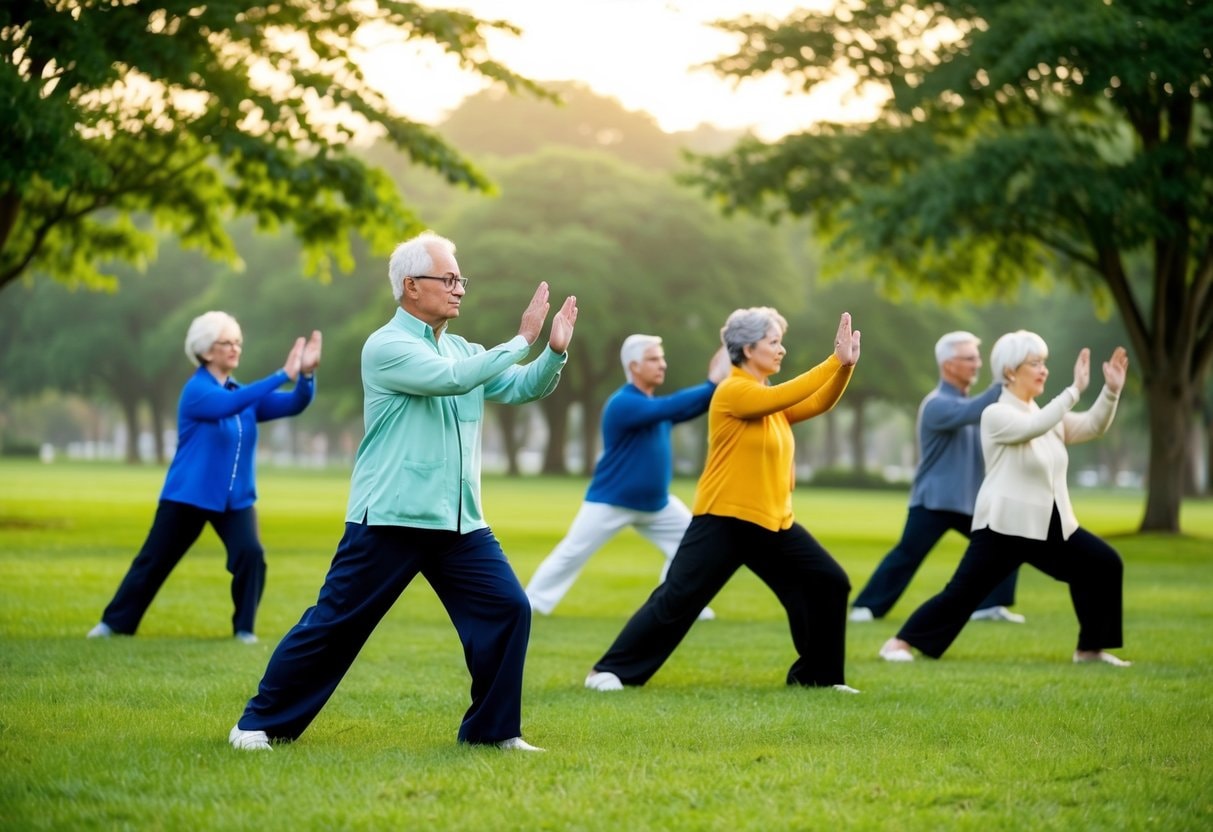
Tai Chi offers amazing benefits for your body, particularly when considering the health benefits of Tai Chi for seniors. It can improve your balance, ease pain, and help with joint problems. Let’s look at how this gentle exercise can boost your physical health.
Enhancing Balance and Reducing Falls
Tai chi can make you steadier on your feet. It helps you reduce the risk of falling by up to 50 percent. The slow, controlled movements strengthen your legs and improve your posture. You’ll learn to shift your weight smoothly from one foot to another. This practice enhances your balance and coordination. Tai chi also teaches you to be more aware of your body’s position.
This awareness can help you catch yourself if you start to stumble. Regular tai chi practice can boost your confidence in moving around. You’ll feel more stable when walking or doing daily tasks, which can help you stay active and independent as you age.
Alleviating Chronic Pain Conditions
If you suffer from ongoing pain, tai chi might bring relief. The gentle movements and deep breathing can help ease discomfort in your body. Studies show that tai chi can reduce symptoms of anxiety and depression linked to chronic pain. It may also improve your mood and self-esteem.
This can make dealing with pain easier. Tai chi’s slow pace allows you to move without straining your muscles or joints. You can adjust the exercises to fit your abilities, making it a safe option for managing various types of chronic pain.
Managing Arthritis and Improving Joint Movement
Tai chi can be a great help if you have arthritis. The smooth, flowing movements lubricate your joints and increase flexibility. This can reduce stiffness and pain. Regular tai chi practice can improve muscle strength and flexibility. Stronger muscles help support your joints, which can ease arthritis symptoms. The gentle stretching in tai chi can also increase your range of motion.
After practicing tai chi, you might find everyday tasks easier. Opening jars, climbing stairs, or reaching for objects could become less painful. Tai chi’s low-impact nature makes it safe for most people with arthritis to try.
Did you Know?
Tai chi can boost brain power in older adults. It may slow cognitive decline in people with mild dementia. The practice helps sharpen focus and memory. Regular tai chi sessions can improve mental clarity. After taking up this exercise, you may find it easier to concentrate on daily tasks.
Mental and Emotional Benefits
Tai Chi offers more than just physical perks for seniors. The health benefits of Tai Chi for seniors extend to boosting mental well-being and emotional health in many ways.
Stress Reduction and Relaxation
Tai Chi helps you relax and lower stress levels. The slow, gentle moves and deep breathing calm your mind. As you focus on each step, daily worries fade away. Your sleep might get better, too.
Many seniors who do Tai Chi report feeling more rested. This is because the practice helps quiet racing thoughts. Tai Chi can also lower your blood pressure. This is good news for your heart and overall health.
Boosting Mood and Mental Health
Feeling down? Tai Chi could help lift your spirits. It’s known to improve mood and fight depression. The mix of movement and mindfulness can make you feel happier. Tai Chi classes offer a chance to meet new people. This social aspect is great for mental health.
You might make new friends and feel less lonely. Tai Chi can be a big help for those with anxiety. Focusing on breathing and slow movements can ease worried thoughts.
Enhancing Cognitive Function
Tai Chi isn’t just good for your body – it’s a workout for your brain. It can boost your memory and thinking skills. The practice helps improve focus and attention. You need to remember and follow moves, which keeps your mind sharp.
Some studies show that tai chi might even slow down mental decline. This is great news for seniors worried about memory loss. Tai Chi also helps with balance and coordination. These skills use many parts of your brain, giving it a full workout.
The Role of Tai Chi in Disease Management
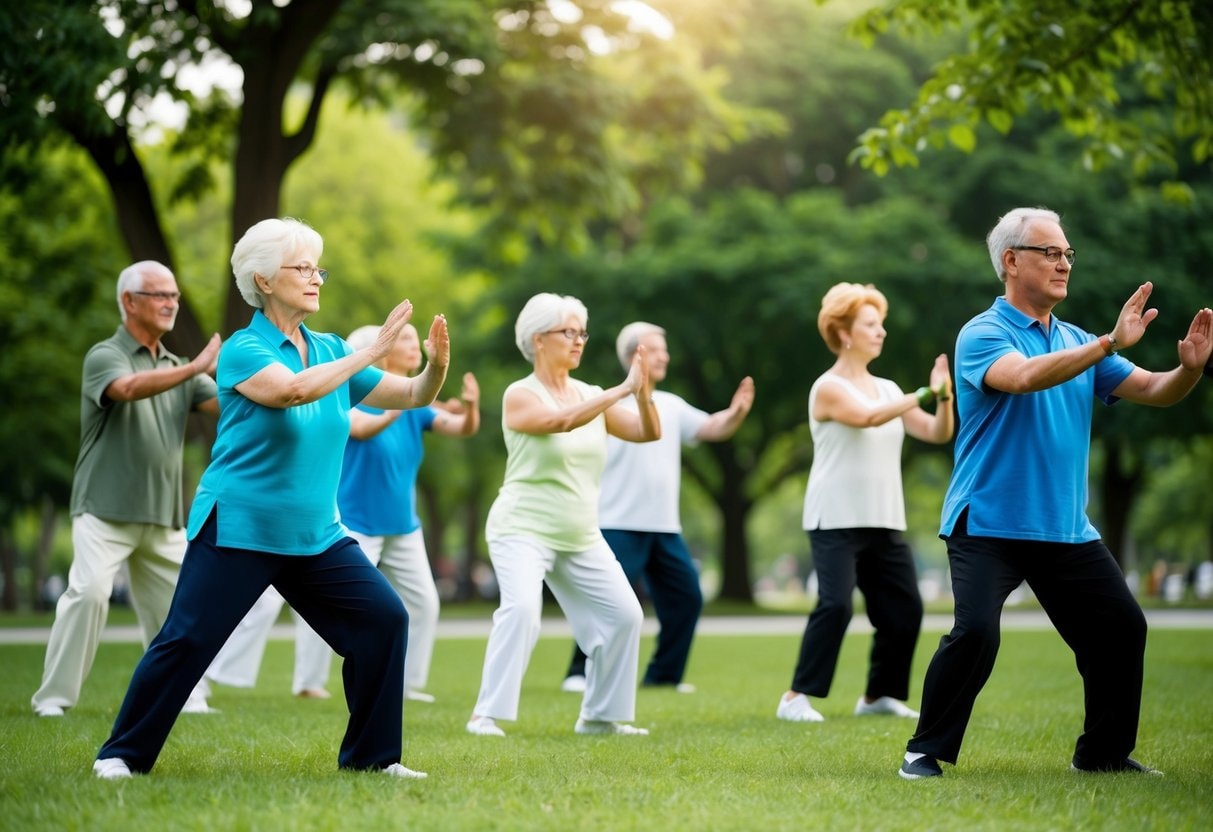
Tai Chi can help manage various health conditions and offers remarkable health benefits for seniors. It enhances heart health, improves breathing, boosts brain function, and promotes better sleep. Let’s look at how this gentle exercise can support your well-being in specific ways.
Addressing Heart and Respiratory Health
Tai chi can boost your heart and lung health. It’s great for improving exercise capacity and lung function if you have breathing issues like COPD. The slow, deep breaths in tai chi help strengthen your lungs. For your heart, tai chi can lower blood pressure and improve circulation.
This makes it easier for your heart to pump blood. You might find it easier to do daily tasks without getting out of breath. Tai chi is also safe if you’re recovering from a heart problem. It’s gentle enough to start slowly and build your strength over time.
Support for Neurological Conditions
If you have Parkinson’s disease, tai chi could help you move better. It improves balance and reduces falls, which are big concerns with Parkinson’s. The smooth movements can also help decrease stiffness in your muscles. For fibromyalgia, tai chi might ease your pain and fatigue. The gentle stretching and mindful movement can relax tense muscles.
Many people find it helps them feel more in control of their symptoms. Tai chi also boosts brain health. It can sharpen memory and focus, making it a great choice if you want to keep your mind sharp as you age.
Improving Sleep Patterns and Disorders
Having trouble sleeping? Taichi might help. The calm, flowing movements can relax your body and mind. This makes it easier to fall asleep at night. If you have insomnia, tai chi could be a natural way to improve your sleep. Regular practice can help you:
- Fall asleep faster.
- Stay asleep longer.
- Wake up feeling more refreshed.
The deep breathing in tai chi is especially good for relaxation. It can lower stress levels, which often interfere with good sleep. By doing tai chi, you might find yourself sleeping better without needing pills or other sleep aids.
Lifestyle and Quality of Life Enhancements
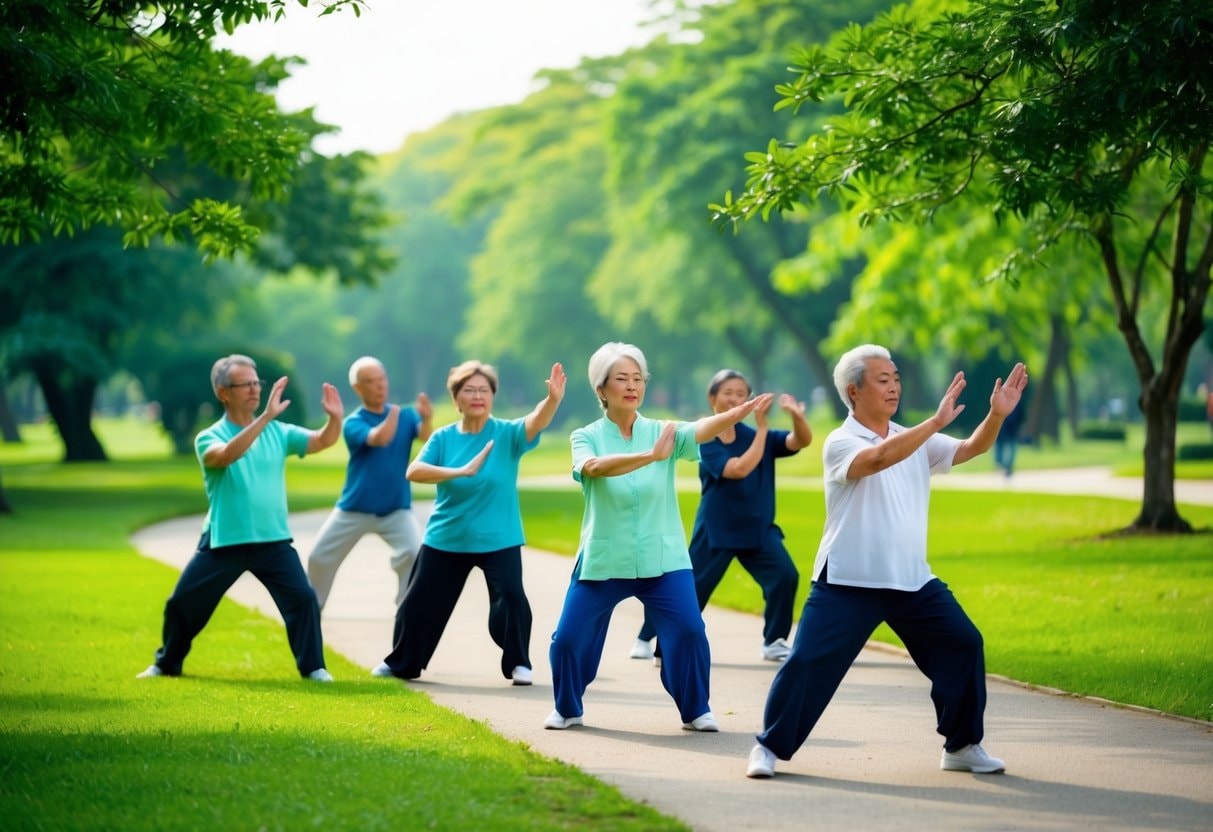
Tai Chi can help manage various health conditions and offers remarkable health benefits for seniors. It enhances heart health, improves breathing, boosts brain function, and promotes better sleep. Let’s look at how this gentle exercise can support your well-being in specific ways.
Encouraging a Healthy Exercise Routine
Tai Chi is a great way to get moving. It’s gentle and low-impact, perfect for older people or those with health issues. You can do it almost anywhere—in a park, at home, or in a class. This exercise fits easily into your day. Try doing Tai Chi for 15-30 minutes each morning.
It’ll help wake up your body and mind. As you get better, you should do it more often. Tai Chi mixes exercise with mindfulness. While you move, you focus on breathing and how your body feels. This can help you feel calmer and more in tune with yourself.
Social Engagement and Community
Joining a Tai Chi class is a fun way to meet people. You’ll see the same faces each week, which can help you make new friends. Many seniors find this social part of Tai Chi as good as the exercise. Group classes create a sense of belonging. You’re all learning together, which can be both fun and motivating.
Some classes even plan social events outside of Tai Chi time. Tai Chi can improve your quality of sleep. Better sleep means you’ll have more energy to enjoy life and spend time with others. You might find yourself saying “yes” to more social invites!
Health Benefits Of Tai Chi For Seniors: Tai Chi Practice Considerations
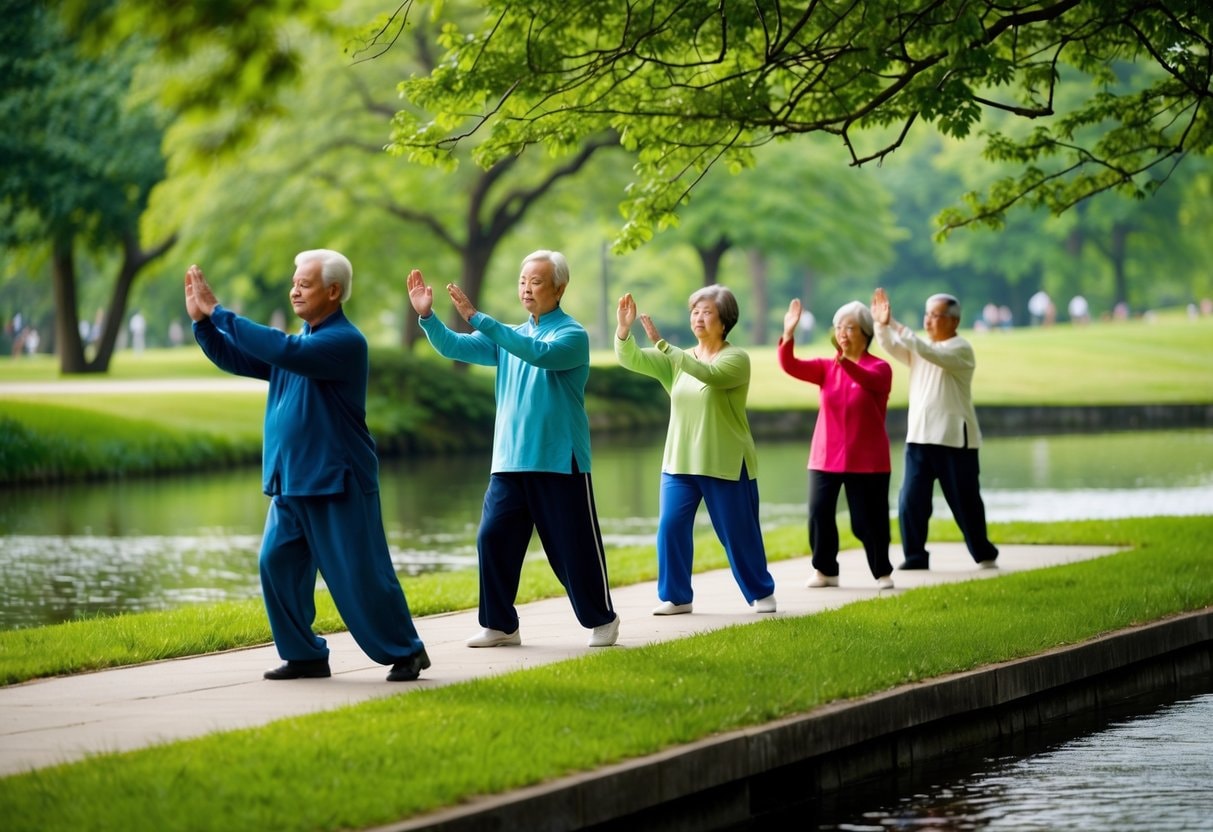
Tai Chi offers many benefits for seniors, but it’s important to approach it thoughtfully. Here are some key things to remember as you start or continue your Tai Chi journey.
Starting Tai Chi as a Senior
You don’t need any special skills to begin Tai Chi. It’s a gentle exercise that’s great for beginners. Start with basic moves and focus on your breathing. Don’t worry about getting everything perfect right away. Look for classes designed for seniors. These will move at a slower pace and use simpler movements. Wear comfortable clothes and shoes that won’t slip.
Tell your instructor about any health issues you have. They can suggest changes to make the moves safer for you. Remember, Tai Chi is about slow, controlled movements. There’s no need to push yourself too hard. As you practice, pay attention to how your body feels. Tai Chi should never cause pain. If something hurts, stop and ask your teacher for help.
Incorporating Tai Chi into Rehabilitation
Tai Chi can be a helpful part of recovery from illness or injury. Its gentle movements are often safe even when other exercises aren’t. Tai Chi may improve balance and reduce fall risk for seniors. Talk to your doctor or physical therapist before starting. They can tell you if Tai Chi is right for your situation. Some rehab centers offer Tai Chi as part of their programs.
If standing is difficult for you, start with seated Tai Chi. As you get stronger, you can try more challenging moves. Focus on the mind-body connection Tai Chi offers. This can help with physical and mental recovery. Keep track of your progress. You might notice improvements in balance, flexibility, or mood. Share these changes with your healthcare team.
Where to Find Tai Chi Classes for Seniors
Many places offer Tai Chi classes for older adults. Check your local:
- Senior centers.
- Community centers.
- Parks and recreation departments.
- YMCAs.
- Health clubs or gyms.
Some healthcare providers also offer Tai Chi. Ask at your doctor’s office or local hospital. Look for classes labeled “gentle” or “for seniors.” These are more likely to fit your needs. Many places let you try a class for free before signing up. Online classes are another option. They let you practice at home at your own pace.
But in-person classes might be better when you’re starting. A teacher can watch your form and help you avoid mistakes. Don’t be shy about asking questions. A good instructor will happily explain things and help you feel comfortable.
Here’s an additional video about Tai Chi.
By: Center Life Balance
Tai Chi: A Gentle Path to Enhanced Well-Being for Seniors
In conclusion, Tai Chi stands out as a powerful and accessible practice for seniors, offering many health benefits beyond mere physical fitness. Its gentle movements enhance balance and flexibility and foster mental clarity and emotional well-being. With the ability to alleviate chronic pain, improve sleep quality, and boost mood, Tai Chi is a holistic approach to wellness that encourages social engagement and community connections.
By incorporating Tai Chi into their daily routines, seniors can experience a transformative journey toward improved health and quality of life. Whether in a class or through guided online sessions, the practice empowers older adults to take control of their physical and mental health. As more seniors discover the profound benefits of Tai Chi, it becomes evident that this ancient practice is indeed a gentle path to enhanced well-being, resilience, and vitality in later years.
Frequently Asked Questions
Can Tai Chi Enhance Balance and Prevent Falls in Elderly Individuals?
Tai chi is great for improving balance in seniors. It reduces the risk of falling, a major concern for older adults. The slow, controlled movements strengthen your legs and core, building stability and confidence in your everyday movements.
Is There a Recommended Frequency for Seniors to Practice Tai Chi for Optimal Health Benefits?
Aim to practice tai chi 2-3 times per week. Each session can last about 30-60 minutes. Start slowly and build up your practice over time. Listen to your body, and don’t push too hard.
What Are the Physical Health Benefits Associated With Tai Chi for the Elderly?
In some cases, Tai chi can lower blood pressure and be used as medication. It also improves flexibility and muscle strength. You may notice better posture and easier breathing. Tai chi can also help manage chronic pain conditions.
Revitalize Your Fitness Journey Beyond 55!
Hello, fitness lovers! Discover the secrets to vitality and well-being with Fit After 55! Whether you’re an experienced athlete or just starting out, our platform serves as your comprehensive resource for holistic health. From establishing realistic goals to celebrating achievements, we’re here to assist you in reimagining what it means to thrive after 55. Visit our website and join our Facebook page today to unleash your full potential with Fit After 55!

